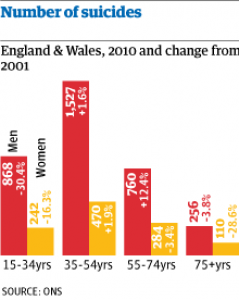Suicide on the rise among older men
Mental health charity says recession may be having greater impact on middle-aged and older men
The number of suicides and the prevalence of suicidal tendencies is rising faster among older men than in any other age group, according to research released in the week the government postponed its suicide prevention strategy.
Data from the Office for National Statistics shows that the number of suicides among men aged over 55 has risen by 12% over the past decade, while suicides by men aged under 34 dropped by 30%.
The mental health charity Calm said men aged 45 to 54 were still most likely to seriously consider taking their own life.
Charities and mental health experts are concerned that across all age ranges there are far more male than female suicides.
Jane Powell, the chief executive of Calm, speculated that the recession may be having more of an impact on older men.
“If you are middle-aged just now and your job and life prospects are diminishing then this is tough,” she said. “There is work to show that the impact of unemployment hits men harder, and later on in life; that it’s easier for women whose lives are not necessarily defined by work and for whom part-time or temporary work isn’t by definition bad.
 “Our research shows that thinking about suicide is more common than we realise, and thatmen and women are almost equally liable to feel suicidal. What is significant is that more men actually go on to take their lives.”
“Our research shows that thinking about suicide is more common than we realise, and thatmen and women are almost equally liable to feel suicidal. What is significant is that more men actually go on to take their lives.”
Official statistics show that 4,517 people in England and Wales killed themselves in 2010, of whom 75% were men.
Powell said there were two reasons for the imbalance. “First, because men are by default supposed to be in control, in charge at all times and so therefore needing help is by
“And second because all too often men don’t recognise what the problem is – they’ll feel out of control, angry with everything, find that their life is out of focus, not be interested in what’s happening around them – and they won’t recognise that they are depressed. And because as a man they’re supposed to be invulnerable, then suddenly the options they have of getting out of their situation start to look very slim.”
Calm, which began as a Department of Health initiative in 1997 and became a charity in 2006, was traditionally focused on reducing suicide among young men. It is changing its remit to include the older generation.
According to a YouGov survey carried out for Calm of adults who had considered taking their own lives, a key factor was relationship status. The number of children in a household was also a factor, with 18% of men with one child expressing suicidal thoughts, compared with 27% with three or more children. The government planned to launch its suicide prevention strategy last week but postponed the initiative until September.
Catherine Johnstone, chief executive of Samaritans, said: “There is strong evidence to show that interventions to support people at risk of suicide make a difference. However, it is often the case that services are failing to reach and engage men, which is why Samaritans launched a campaign in late 2010 to target working-class men who are the most at risk.
“Suicide is preventable and requires the action of multiple government departments. We welcome the forthcoming suicide prevention strategy for England and hope that it will continue to be a catalyst for change. To make a real impact, however, the strategy requires commitment from the public, private and voluntary sectors, as well as government.”
Last week it emerged that people in Manchester were more likely to kill themselves than in any other city. At a public meeting called by Manchester Users Network, a group for people with mental health issues, participants criticised cuts to services, in particular community centres, which act as lifelines to people with depression.
A Department of Health spokesperson said: “The government is taking strong action on suicide prevention. We have been listening to families who have sadly been bereaved following a suicide, and have called upon experts in healthcare, criminal justice and transport to help us put together a new suicide prevention strategy for England to help save lives.We have considered all the responses received, and intend to publish our plans in September.”
Credit: http://www.guardian.co.uk/society/2012/jul/15/suicide-rise-older-men

